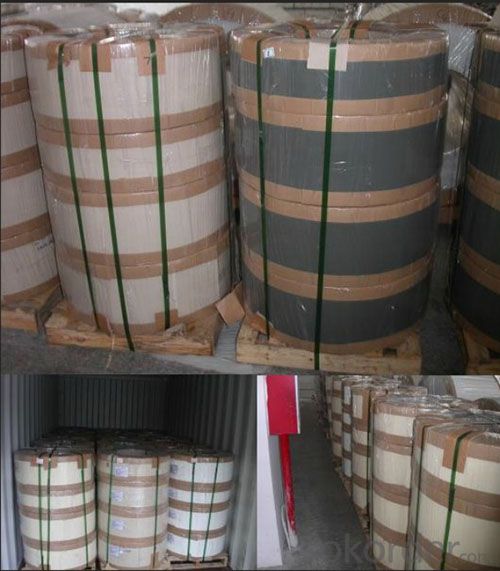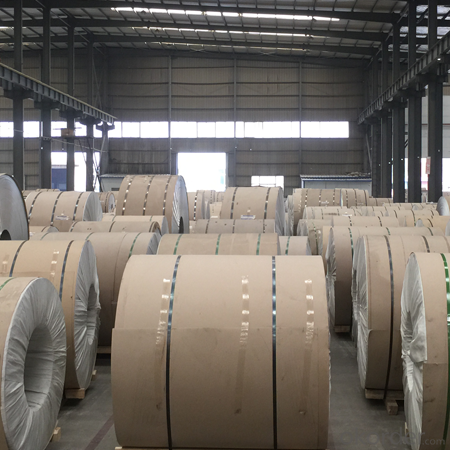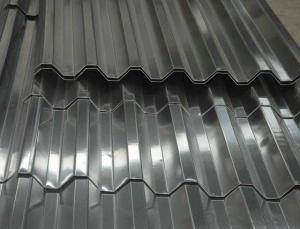Alloy 3003 Aluminium Roll for Roofing/Ceiling/Gutter/Decoration
- Loading Port:
- Tianjin
- Payment Terms:
- TT OR LC
- Min Order Qty:
- 2 m.t.
- Supply Capability:
- 60000 m.t./month
OKorder Service Pledge
OKorder Financial Service
You Might Also Like
Item specifice
Alloy 3003 Aluminium Roll for Roofing/Ceiling/Gutter/Decoration
Specification
Aluminium sheet | |||||
Alloy No. | Thickness (mm) | Width (mm) | Length (mm) | Temper | |
A1050,A1060, A1070, A1100 | 0.2-100 | 20-2200 | 20-8000 | O,H12,H22,H14,H16,H18, H24,H26,etc | |
3A21, A3003, A3105, A3004 | 0.2-100 | 20-2200 | 20-8000 | O,H14,H18,H24,etc | |
A5052, A5005, A5083, A5754 | 0.2-100 | 20-2200 | 20-8000 | O,H18,H24,H32,H34,H111,H112 ,etc | |
A6061, A6082, A6063 | 0.2-200 | 20-2200 | 20-8000 | T4,T6, T651,etc | |
A8011 | 0.2-100 | 20-2200 | 20-8000 | O,H12,H22,H14,H16,H18,H24,H26, etc | |
Packing: Export wooden pallets. The bundle weight not exceed 2MT. Loading: by 1x20GP, 1X20GP can load about 18MT | |||||
Standards: ASTM-B209. EN573-1, GB/T3880.1-2006 | |||||
Quality of material: totally free from defects like white rust, oil patches, roll marks, edge damage, camber, dents, holes, break lines, scratches and free from coil set | |||||
Application : Mainly used insigns, billboards, building exterior decoration, bus body, high-rise buildings and factories wall decoration, kitchen sink, lamp, fan leaves, with pieces of electronic, chemical equipment, sheet metal processing parts, deep drawing or spinning hollowware, welding parts, heat exchangers, bell surface and disk, plate, kitchenware, decorations, reflective devices, ect | |||||
MOQ | 5 tons | ||||
Payment term | T/T,L/C | ||||
Delivery Time | 15-60 days after 30% T/T payment or receiving L/C copy | ||||
Kind attention: Specifications can be customized as the customer’s requirements. | |||||
Packing


FAQ
Q: How can I request a product sample? A: The samples are free but freight should be collected. Please send sample list and courier account number by email.
Q: How can I request a product catalog? A: The hard copies of catalogs are free but freight should be collected. Please send courier account number by email. You are suggested to request a PDF catalog.
Q: Wha's your payment terms? A: One is T/T 30% before production and 70% against copy of B/L; the other is Irrevocable L/C 100% at sight.
Q: What's your trade terms? A: FOB, CNF(CFR), CIF, EXW.
Q: How long is the quality guarantee? A: All of our products have a period of quality guarantee since time of shipment. Please contact your salesman for more details, as different products enjoy different time of guarantee
- Q:Are there any restrictions on the coil thickness of aluminum coils?
- Yes, there are typically restrictions on the coil thickness of aluminum coils. The specific restrictions may vary depending on the intended application and industry standards. Generally, the thickness of aluminum coils is limited by the capabilities of the manufacturing equipment and the desired final product. Thinner coils are often preferred for applications that require flexibility, such as in the manufacturing of foils or flexible packaging materials. On the other hand, thicker coils are commonly used in industries like construction or automotive, where strength and durability are important factors. Additionally, the thickness of aluminum coils may be restricted by the availability and cost of raw materials. It is important for manufacturers to adhere to these restrictions to ensure the quality and performance of the final product.
- Q:Can aluminum coils be painted or coated?
- Yes, aluminum coils can be painted or coated. Aluminum is a versatile material that can be painted or coated with various finishes to enhance its appearance and protect it from corrosion. The process of painting or coating aluminum coils typically involves cleaning and preparing the surface, applying a primer, and then applying the desired paint or coating. The type of paint or coating used will depend on the desired finish and the intended application of the aluminum coil.
- Q:Are parakeets allergic to aluminum because I wanted to use a metal pie pan for a bird bath.
- Aluminum is poisonous for birds (and not good for us either) Better to use a glass bowl or pie plate for the bird's bath.
- Q:Can aluminum coils be used for automotive body panels?
- Certainly, automotive body panels can be made using aluminum coils. In fact, aluminum is gaining popularity in the automotive sector due to its numerous advantages. Its lightweight nature contributes to enhanced fuel efficiency and overall vehicle performance. Furthermore, aluminum exhibits exceptional resistance to corrosion, making it a durable option for automotive body panels. Additionally, aluminum can be easily shaped and molded, enabling intricate designs and improved aerodynamics. All in all, utilizing aluminum coils for automotive body panels presents a viable choice with a multitude of benefits.
- Q:Are there any limitations on the welding or soldering of aluminum coils?
- Yes, there are limitations on welding or soldering aluminum coils. Aluminum has a relatively low melting point and high thermal conductivity, which can make it challenging to weld or solder effectively. The oxide layer on the surface of aluminum also makes it difficult to achieve a strong bond. Additionally, aluminum is prone to distortion and warping during the welding or soldering process. Therefore, special techniques and equipment, such as using specialized fluxes, inert gases, and proper pre-cleaning, are required to overcome these limitations and achieve successful welds or solder joints on aluminum coils.
- Q:Well, we've got the existing old school 7 layers of peeling yucky painted siding and we're trying to weigh our options. So here's my questions:1) Is it cost effective to replace Aluminum with Vinyl?2) Is Vinyl truly as costly as we keep hearing? **Home is small 1,100 sq.ft with a 2.5 car Garage**3) Is painting this existing siding a wise choice since the current paint job on it looks terrible? We just need to make it more a home, right now it's gorgeously all new and redone inside and on the outside it still resembles the day we bought it in forclosure. Aside from my green grass I busted my butt on last summer.Please advise.
- Vinyl is final. Change your siding. It will cost a little more now, but you will save a lot in the long run. If it buckles like one of your other answers, It means that it was installed improperly. Vinyl should not be nailed to tight. It needs to expand and contract with the temperature changes.
- Q:How are aluminum coils used in the production of signage and displays?
- Aluminum coils are commonly used in the production of signage and displays due to their versatility and durability. These coils are typically used to create the framework or structure of the signage or display, providing a sturdy base. They can be easily shaped, cut, and formed into various designs and sizes, allowing for customization and creativity. Additionally, aluminum coils are lightweight, making them easy to handle and install. Their corrosion resistance also ensures that the signage or display remains intact and visually appealing even in outdoor or high-moisture environments.
- Q:What is the typical heat transfer coefficient for aluminum coils?
- The heat transfer coefficient for aluminum coils can vary depending on several factors, including the application, coil geometry, and surrounding conditions. Generally, aluminum has high thermal conductivity, which enables efficient heat conduction. In forced convection applications, where heat is transferred using a fluid like air or water, the heat transfer coefficient for aluminum coils can range from 10 to 100 W/m^2K. This range is influenced by factors such as flow rate, velocity, and temperature difference between the coil and the fluid. In natural convection scenarios, where heat transfer occurs due to the buoyancy-driven flow of air, the heat transfer coefficient for aluminum coils is typically lower, ranging from 5 to 25 W/m^2K. This is because the movement of air is slower and the heat transfer effectiveness is reduced compared to forced convection. It's important to note that these values are general guidelines and can vary significantly depending on specific design considerations, material properties, and operating conditions. Therefore, it is recommended to consult specific heat transfer data or conduct detailed experiments or simulations to determine the precise heat transfer coefficient for a given aluminum coil application.
- Q:Are there any restrictions on the coil thickness of aluminum coils?
- Yes, there are certain restrictions on the coil thickness of aluminum coils. The thickness of aluminum coils may vary depending on the specific application and manufacturing process. However, it is generally limited by practical constraints such as the equipment capabilities, handling and transportation considerations, and the desired properties of the final product.
- Q:What are the maximum operating temperatures for aluminum coils?
- The specific alloy and application used can determine the maximum operating temperatures for aluminum coils. In general, aluminum coils can endure high temperatures without significant degradation or performance problems. Common aluminum alloys like 3003 and 5052 have a maximum operating temperature of approximately 300-400 degrees Fahrenheit (150-200 degrees Celsius). These temperatures are suitable for most industrial and commercial uses, including HVAC systems, refrigeration units, and heat exchangers. Specialized aluminum alloys, such as 4004 and 4343, are designed for high-temperature applications. These alloys can withstand temperatures up to 550-650 degrees Fahrenheit (290-340 degrees Celsius) without significant structural or performance damage. It's important to note that the maximum operating temperature can vary depending on factors like coil thickness, heat transfer conditions, and duration of exposure to high temperatures. Therefore, it is advisable to consult the manufacturer's guidelines or perform temperature tests to determine the safe operating limits for a specific aluminum coil in a particular application.
1. Manufacturer Overview |
|
|---|---|
| Location | |
| Year Established | |
| Annual Output Value | |
| Main Markets | |
| Company Certifications | |
2. Manufacturer Certificates |
|
|---|---|
| a) Certification Name | |
| Range | |
| Reference | |
| Validity Period | |
3. Manufacturer Capability |
|
|---|---|
| a)Trade Capacity | |
| Nearest Port | |
| Export Percentage | |
| No.of Employees in Trade Department | |
| Language Spoken: | |
| b)Factory Information | |
| Factory Size: | |
| No. of Production Lines | |
| Contract Manufacturing | |
| Product Price Range | |
Send your message to us
Alloy 3003 Aluminium Roll for Roofing/Ceiling/Gutter/Decoration
- Loading Port:
- Tianjin
- Payment Terms:
- TT OR LC
- Min Order Qty:
- 2 m.t.
- Supply Capability:
- 60000 m.t./month
OKorder Service Pledge
OKorder Financial Service
Similar products
New products
Hot products
Related keywords





























